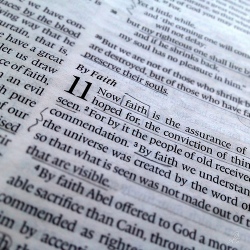For hundreds of millions of Christians around the world, today is Easter. It’s a day when we celebrate the resurrection of Jesus, which is central to the Christian faith. For many other people, it’s just a time to feel superior to religious people — on the assumption that religious people live by faith and the atheist world lives by “reality.” I’d like to suggest that faith is at the root of what everyone believes.
Faith means having a belief in something that you can’t prove with certainty. There’s no question that much of religious belief is completely based on faith. But what about the rest of life? What about all the other things that you accept as true, but which you couldn’t prove if your life depended on it?
On a mundane level, you have faith in a lot of things that you can’t prove. Have you been to Moscow? Or to the North Pole? Or to Cairo? Most of us haven’t been to those places, yet we believe in them, because we’ve seen pictures and read stories and heard experiences from other. We believe the evidence is strong that they exist, enough so that we wouldn’t question their existence.
You believe in atoms and various sub-atomic particles, even if you don’t have a clue what they really are. You can’t see them. You don’t really understand them. But you were taught in science class that they were the building blocks of all matter, so you believe. Can you prove it? No, you can’t. You just have faith that the people who should know something about this really do.
You can’t even prove that the world around you exists. You believe you’re reading an article on a computer or phone right now. You believe that there’s a world of billions of other people with their own individual lives. You believe you live on a complex ecosystem called Earth. You believe those things because you see them and hear them. You believe your senses. But how do you know your senses are real? How do you know that anything exists? How do you know that this world isn’t just an illusion created inside your own mind? How do you know that you’re not the only consciousness that exists — and you’ve made up everything else?
In all of these cases, you can’t prove anything other than your own consciousness, but you accept various things I’ve listed here as fact. Why? Because the evidence is strong enough, in your judgement. Or you’ve experienced enough of something for it to seem reasonable to accept your experiences as real. Whether you like it or not, those things you are accepting as true are the things you accept on faith.
We can — and do — disagree about what’s reasonable to have faith in. For example, I don’t find what Muslims believe credible. I don’t find what Hindus believe believable. And I don’t find what Mormons believe to be reasonable. In the same way, those groups don’t accept my faith in the central points of Christian salvation. And those who are atheists or agnostics don’t accept what any of us believe. To them, we’re all crazy to accept any of it.
So we can expect to disagree about what to have faith in. Your faith might be in the supremacy of science or the logic of your particular brand of philosophy. But just because you have an internally consistent system, that doesn’t mean it’s proven. It merely means that you’ve built a logical house on a foundation of assumptions. The assumptions that lie at the root of your system are the things you have faith in.
 For me, I’ve experienced what I believe to be God’s presence. I can’t prove it to you. I don’t even have any desire to prove it. The only thing I want to do is to tell you what I believe and what I’ve experienced — in the best way I can communicate it. I can bear witness to what I’ve experienced. I can tell you what I believe in my heart to be true. But I can’t prove it. I believe that only God gives faith. I also believe that if I hadn’t experienced God and hadn’t been given this faith, I’d be right there with you making fun of it.
For me, I’ve experienced what I believe to be God’s presence. I can’t prove it to you. I don’t even have any desire to prove it. The only thing I want to do is to tell you what I believe and what I’ve experienced — in the best way I can communicate it. I can bear witness to what I’ve experienced. I can tell you what I believe in my heart to be true. But I can’t prove it. I believe that only God gives faith. I also believe that if I hadn’t experienced God and hadn’t been given this faith, I’d be right there with you making fun of it.
I don’t really see any reason for atheists and Christians to be in conflict. I don’t see why we can’t agree to disagree. Non-believers haven’t experienced something that I know is real, so it seems very reasonable to me that they don’t believe. I’d like them to experience what I have, but that only happens through faith — and I can’t give that to anyone.
We all have our faith in something. For some, their faith might be in UFOs. For others, their faith is in chemtrails or Bigfoot. For others, their faith is in biochemistry or the writings of Ayn Rand. For me, I know what I have my faith in. The God I know is much more personal and real to me than your philosophy is to you.
We differ radically in what we believe in, but it’s very clear that we all have faith in something.

 FDA’s war on margarine is really an attack on your freedom of choice
FDA’s war on margarine is really an attack on your freedom of choice Loss of cultural consensus means violent conflict in decades ahead
Loss of cultural consensus means violent conflict in decades ahead What can a free society do before an unstable person commits a crime?
What can a free society do before an unstable person commits a crime?